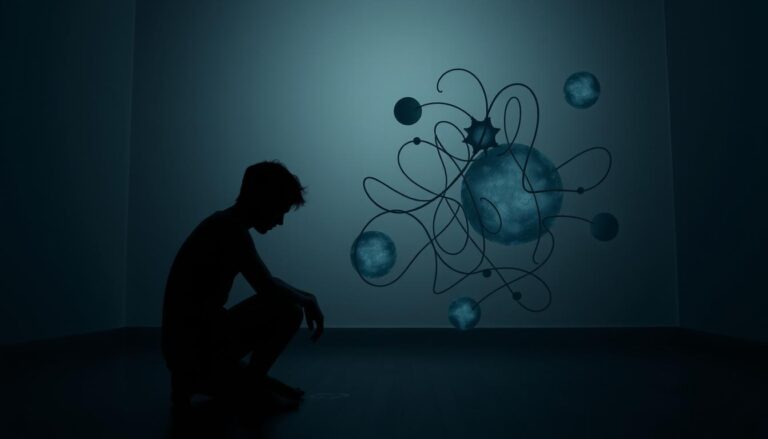Holistic healing is a game-changing wellness approach. It treats the whole person – mind, body, and spirit. This method goes beyond just addressing isolated symptoms1.
The holistic framework recognises the interconnected nature of our being. It understands that true healing requires a comprehensive approach. This includes physical, emotional, and spiritual dimensions2.
Modern healthcare is increasingly embracing complementary therapies. These support whole-person treatment for complex behavioural health conditions. Holistic approaches blend diverse practices like yoga, meditation, reiki, and acupuncture1.
The mind-body-spirit connection is central to holistic practices. These treatments address underlying causes of physical and mental challenges. They empower individuals to achieve optimal wellness1.
Clients often experience enhanced emotional resilience through these integrative techniques. Overall health improvements are also common outcomes2.
Holistic therapy offers versatile treatment options for various conditions. It can effectively tackle depression, anxiety, and trauma. The aim is to support profound, sustainable personal transformation1.
Understanding the Foundations of Holistic Therapy
Holistic therapy is a comprehensive approach to healing. It goes beyond traditional medical treatments. This method considers the connections between mind, body, and spirit3.
Holistic therapy has roots in ancient civilisations. Hippocrates’ philosophy greatly influenced this approach. It focuses on treating the whole person, not just symptoms3.
Ancient Origins and Global Influences
Holistic healing practices have rich historical foundations in multiple medical traditions:
- Ayurvedic medicine from India
- Traditional Chinese medicine (TCM)
- Ancient Greek philosophical approaches
Core Principles of Whole-Person Treatment
The fundamental principles of holistic therapy include:
- Treating the entire person
- Recognising interconnectedness of physical and mental states
- Focusing on prevention and self-healing3
| Holistic Therapy Type | Primary Focus |
|---|---|
| Herbal Remedies | Natural healing and symptom management4 |
| Yoga | Stress reduction and mental clarity4 |
| Meditation | Mental well-being and emotional balance4 |
Mind-Body-Spirit Connection in Healing
The mind-body-spirit connection is key in complementary and alternative medicine. This view recognises how emotions and spiritual experiences affect physical health5.
“Healing is a matter of time, but it is sometimes also a matter of opportunity.” – Hippocrates
Modern holistic therapy blends traditional wisdom with current scientific knowledge. It offers a thorough approach to wellness. This method addresses individual needs in a holistic manner3.
Key Components of Holistic Therapy Health
Holistic therapy takes a comprehensive approach to wellness. It combines various healing practices to support overall health. Mind and body therapies are central to this approach6.
These therapies address the links between physical, emotional, and mental well-being. They aim to create balance in all aspects of a person’s life.
- Mind and Body Therapies:
- Meditation and mindfulness practices
- Yoga and tai chi
- Art and music therapy
- Relaxation techniques
- Natural Therapies:
- Herbal remedies
- Nutritional supplements
- Dietary modification strategies
Body therapies are vital in holistic healing. Techniques like massage, chiropractic care, and reflexology help release tension. These methods promote physical balance7.
Energy therapies, such as Reiki, aim to restore the body’s natural energy fields. They support emotional and spiritual wellness6.
Holistic therapy views individuals as complete, interconnected beings – not just a collection of separate symptoms.
Integrated body therapies create a harmonious approach to health. They address physical, mental, emotional, and spiritual aspects. Holistic practitioners help people achieve optimal well-being6.
Evidence-Based Benefits of Holistic Treatment
Holistic therapy offers a comprehensive approach to healing. It goes beyond traditional treatment methods. Research demonstrates its profound impact on mental and physical well-being.
Mental Health Transformations
Holistic therapy techniques can greatly help those with depression and anxiety. Evidence-based practices offer a multifaceted approach to stress management8.
Clients receive personalised treatment plans addressing root causes of mental health issues. This enables deeper emotional healing and long-term well-being8.
Physical Wellness and Recovery
Holistic treatments provide comprehensive physical wellness strategies. Equine therapy shows remarkable results in addiction recovery and trauma healing9.
Research indicates recreational therapy can significantly reduce stress. It can also enhance cognitive function9.
| Therapy Type | Mental Health Benefits | Physical Outcomes |
|---|---|---|
| Yoga Therapy | Stress Reduction | Improved Flexibility |
| Art Therapy | Emotion Regulation | Creative Expression |
| Music Therapy | Emotional Processing | Relaxation |
Emotional Balance and Stress Reduction
The mind-body connection is central to holistic healing. Integrating multiple therapeutic approaches can achieve remarkable emotional balance9.
About 62% of Americans now use integrative medicine therapies. This shows growing recognition of these comprehensive treatment methods10.
Holistic therapy provides a path to healing that nurtures the entire person—mind, body, and spirit.
Modern Applications in Healthcare Settings
Integrative medicine is reshaping UK healthcare. It blends complementary therapies with mainstream medical practices. Holistic health approaches are gaining traction in medical circles11.
Nearly 50% of people in developed nations use Traditional, Complementary and Integrative Medicine (TCIM). This shows a major shift in how people view healthcare11.
Holistic nursing is reimagining patient care through a comprehensive lens. Mind-body clinics are creating new treatment strategies for overall wellness. These centres offer integrated services such as:
- Acupuncture
- Massage therapy
- Meditation programmes
- Nutritional counselling
Integrative medicine is crucial for managing chronic conditions. About 75% of healthcare spending goes towards chronic diseases. Complementary therapies offer new ways for treatment and prevention11.
Modern healthcare is not about replacing conventional medicine, but expanding its healing potential through holistic approaches.
Hospitals now use complementary therapies in various departments. These range from oncology to mental health. This shows a recognition of the link between physical, emotional, and psychological well-being.
Clinical practice guidelines now include complementary approaches. These are used in areas like cardiovascular health and pain management11.
Conclusion
Holistic therapy transforms personalised wellness by bridging traditional medicine and comprehensive health management12. It addresses psychological, biological, and spiritual aspects of health. This approach empowers individuals to actively participate in their healthcare journey12.
Integrated healthcare recognises the interconnectedness of human health12. Research shows holistic techniques can complement conventional treatments effectively. This offers patients more tailored care pathways.
Orthodox and alternative approaches are now seen as complementary parts of health synthesis12. Mental health is a crucial consideration in this approach. About 1 in 5 adults face mental health challenges yearly13.
Holistic strategies provide a framework for addressing complex wellness needs12. The focus on patient uniqueness creates a more supportive healthcare environment. This approach fosters mutual doctor-patient relationships.
Holistic therapy is a powerful model for promoting overall well-being. It integrates physical, emotional, and spiritual dimensions of health. This approach offers a promising pathway to more comprehensive, personalised healthcare solutions.
FAQ
What exactly is holistic therapy?
Holistic therapy treats the whole person – mind, body, and spirit. It combines traditional and alternative methods to support overall well-being. This approach includes practices like meditation, herbal remedies, massage, and yoga.
How does holistic therapy differ from conventional medicine?
Holistic therapy takes a whole-person approach, unlike conventional medicine’s focus on specific symptoms. It considers the link between physical, emotional, and spiritual health. Holistic therapy uses natural treatments and lifestyle changes to support wellness.
What types of conditions can holistic therapy help with?
Holistic therapy can benefit mental health issues, stress-related disorders, and chronic pain. It’s effective for managing conditions with complex physical and emotional components. These include chronic illness, addiction recovery, and trauma healing.
Is holistic therapy scientifically proven?
Many scientific studies have shown the effectiveness of holistic therapy approaches. Research has demonstrated positive outcomes in stress reduction and pain management. Practices like meditation, yoga, and acupuncture have substantial evidence supporting their benefits.
Can holistic therapy be used alongside conventional medical treatments?
Yes, holistic therapy often complements conventional medicine. Many healthcare settings now integrate holistic therapies with traditional treatments. It’s best to consult healthcare professionals to develop an integrated treatment plan.
What are some common holistic therapy techniques?
Common techniques include meditation, mindfulness, yoga, and tai chi. Herbal remedies, massage therapy, and acupuncture are also popular. Art therapy, music therapy, and nutritional counselling are other beneficial practices.
Is holistic therapy suitable for everyone?
Holistic therapy can benefit many, but individual suitability varies. Factors like personal health conditions and current treatments play a role. Consult qualified healthcare professionals for personalised guidance on safe and appropriate therapies.
How long does it take to see results from holistic therapy?
Results vary depending on the individual and the condition being addressed. Some experience immediate benefits like stress reduction. Others may notice gradual improvements over weeks or months. Consistency and a long-term approach are key to achieving optimal results.





